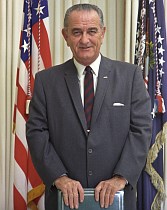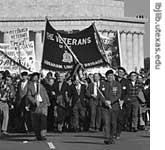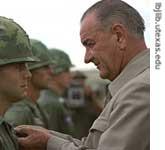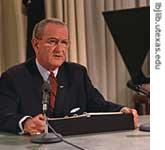VOA慢速英语 2007 0412b
时间:2019-01-11 作者:英语课 分类:VOA慢速英语2007年(四)月
VOICE ONE:
This is Doug Johnson.
VOICE TWO:
And this is Phil Murray with THE MAKING OF A NATION -- a VOA Special English program about the history of the United States.
(MUSIC)

Today, we continue the story of America's thirty-sixth president, Lyndon Johnson.
(MUSIC)
VOICE ONE:
After John Kennedy was murdered, Vice 1 President Lyndon Johnson served the last fourteen months of Kennedy's term. He then was elected to his own full term. It began in January, nineteen sixty-five. Much of his time and energy would be taken up by the war in Vietnam.
By early nineteen sixty-four, America had about seventeen thousand troops in Vietnam. The troops were there to advise and train the South Vietnamese military.
VOICE TWO:
Vietnam had gained its independence from France in nineteen fifty-four. The country was divided into North and South. The North had a Communist government led by Ho Chi Minh. The South had an anti-Communist government led by Ngo Dinh Diem.
In nineteen fifty-seven, Communist rebels -- Vietcong -- began a campaign of terrorism in South Vietnam. They were supported by the government of North Vietnam and later by North Vietnamese troops. Their goal was to overthrow 2 the anti-Communist government in the South.
President Johnson believed that the United States had to support South Vietnam. Many other Americans agreed. They believed that without American help, South Vietnam would become Communist. Then, all of Southeast Asia would become Communist, too.
(MUSIC)
VOICE ONE:
As Johnson's term began, his military advisers 3 told him the Communists were losing the war. They told him that North Vietnamese troops and Vietcong forces would soon stop fighting.
On February sixth, however, the Vietcong attacked American camps at Pleiku and Qui Phon. The Johnson administration immediately ordered air attacks against military targets in the North.
VOICE TWO:
Some observers in the United States questioned the administration's policy. For example, a leading newspaper writer, James Reston, said President Johnson was carrying out an undeclared and unexplained war in Vietnam.
Johnson defended his policies. He said withdrawal 5 would not bring an end to the conflict. He said the battle would continue in one country, and then another.
VOICE ONE:
In March, nineteen sixty-five, the first American ground troops arrived in South Vietnam. Congress supported the president's actions at that time. However, the number of Americans who opposed the war began to grow. These people said the war was a civil war. They said the United States had no right, or reason, to intervene.
VOICE TWO:
For six days in May, the United States halted air attacks on North Vietnam. The administration hoped this would help get the North Vietnamese government to begin negotiations 6.
The North refused. And the United States began to build up its forces in the South. By July, one hundred twenty-five thousand Americans were fighting in Vietnam.
VOICE ONE:
Some Americans became angry. Anti-war demonstrations 7 took place in the cities of San Francisco and Chicago. More and more students began to protest. They wanted the war to end quickly.

October 21, 1967: Marchers in Washington protest the Vietnam War
Writer James Reston commented that the anti-war demonstrations were not helping 8 to bring peace to Vietnam. He said they were postponing 9 it. He believed the demonstrations would make Ho Chi Minh think America did not support its troops. And that, he said, would make president Ho continue the war.
VOICE TWO:
In December, nineteen sixty-five, the United States again halted air attacks against North Vietnam. Again, it invited the North Vietnamese government to negotiate an end to the fighting. And again, the North refused.
Ho Chi Minh's conditions for peace were firm. He demanded an end to the bombing and a complete American withdrawal.
Withdrawal would mean defeat for the South. It would mean that all of Vietnam would become Communist. President Johnson would not accept these terms. So he offered his own proposals. The most important was an immediate 4 ceasefire. Neither side would compromise, however. And the fighting went on.
VOICE ONE:

October 26, 1966: President Johnson honors American troops at Cam Ranh Bay, Vietnam
In nineteen sixty-six, President Johnson renewed the bombing attacks in North Vietnam. He also increased the number of American troops in South Vietnam. He condemned 10 those who opposed his policies. He said: "The American people will stand united until every soldier is brought home safely. They will stand united until the people of South Vietnam can choose their own government."
(MUSIC)
VOICE TWO:
Local and state elections were held in the United States that year. The war in Vietnam had an effect on those elections. The opposition 11 Republican Party generally supported the president's war efforts. Yet it criticized him and other Democrats 12 for economic problems linked to the war.
The war cost two thousand million dollars every month. The price of many goods in the United States began to rise. The value of the dollar began to drop. The result was inflation. Then economic activity slowed, and the result was recession.
VOICE ONE:
To answer the criticism, administration officials said progress was being made in Vietnam. But some Americans began to suspect that the government was not telling the truth about the war.
Several news writers, for example, said the number of enemy soldiers killed was much lower than the government reported. Opposition to the war and to the administration's war policies led to bigger and bigger anti-war demonstrations.
Studies were done to measure Americans' opinion on the issue. In a study in July, nineteen sixty-seven, a little more than half the people questioned said they did not approve of the president's policies. Yet most Americans believed he would run again for president the next year.
VOICE TWO:
Johnson strongly defended the use of American soldiers in Vietnam. In a speech to a group of lawmakers he said: "Since World War Two, this nation has met and has mastered many challenges -- challenges in Greece and Turkey, in Berlin, in Korea, in Cuba. We met them because brave men were willing to risk their lives for their nation's security. And braver men have never lived than those who carry our colors in Vietnam this very hour."
VOICE ONE:
Then came Tet -- the Vietnamese lunar new year -- in January nineteen-sixty-eight. The Communists launched a major military campaign. They attacked thirty-one of the forty-four provinces of South Vietnam. They even struck at the American embassy in the capital, Saigon.
Fifty thousand Communist soldiers were killed during the Tet offensive. Fourteen thousand South Vietnamese soldiers were killed. And two thousand American soldiers were killed. Thousands of Vietnamese civilians 13 were killed, too.
VOICE TWO:
Many Americans were surprised, even shocked, that the Communists could launch such a major attack against South Vietnam. For several years, they had been told that Communist forces were small and were losing badly. As a result, popular support for the administration fell even more.
Democrats who opposed President Johnson seized this chance. Several ran against him in the primary elections held before the party's presidential nominating convention. These included Senator Robert Kennedy of New York and Senator Eugene McCarthy of Minnesota. Kennedy and McCarthy did well in the early primary elections. Johnson did poorly.
VOICE ONE:

March 31, 1968: Johnson announces a bombing halt in Vietnam and his plan not to seek re-election
At the end of March, nineteen sixty-eight, the president spoke 14 to the American people on television. He told of his proposal to end American bombing of North Vietnam. He told of the appointment of a special ambassador to start peace negotiations. And he told of his decision about his own future:
LYNDON JOHNSON: "I do not believe that I should devote an hour or a day of my time to any personal partisan 15 causes or to any duties other than the awesome 16 duties of this office -- the presidency 17 of your country. Accordingly, I shall not seek, and I will not accept, the nomination 18 of my party for another term as your president."
(MUSIC)
VOICE TWO:
This program of THE MAKING OF A NATION was written by Jeri Watson and produced by Paul Thompson. This is Phil Murray.
VOICE ONE:
And this is Doug Johnson. Join us again next week for another VOA Special English program about the history of the United States.
- He guarded himself against vice.他避免染上坏习惯。
- They are sunk in the depth of vice.他们堕入了罪恶的深渊。
- After the overthrow of the government,the country was in chaos.政府被推翻后,这个国家处于混乱中。
- The overthrow of his plans left him much discouraged.他的计划的失败使得他很气馁。
- a member of the President's favoured circle of advisers 总统宠爱的顾问班子中的一员
- She withdrew to confer with her advisers before announcing a decision. 她先去请教顾问然后再宣布决定。
- His immediate neighbours felt it their duty to call.他的近邻认为他们有责任去拜访。
- We declared ourselves for the immediate convocation of the meeting.我们主张立即召开这个会议。
- The police were forced to make a tactical withdrawal.警方被迫进行战术撤退。
- They insisted upon a withdrawal of the statement and a public apology.他们坚持要收回那些话并公开道歉。
- negotiations for a durable peace 为持久和平而进行的谈判
- Negotiations have failed to establish any middle ground. 谈判未能达成任何妥协。
- Lectures will be interspersed with practical demonstrations. 讲课中将不时插入实际示范。
- The new military government has banned strikes and demonstrations. 新的军人政府禁止罢工和示威活动。
- The poor children regularly pony up for a second helping of my hamburger. 那些可怜的孩子们总是要求我把我的汉堡包再给他们一份。
- By doing this, they may at times be helping to restore competition. 这样一来, 他在某些时候,有助于竞争的加强。
- He tried to gain time by postponing his decision. 他想以迟迟不作决定的手段来争取时间。 来自辞典例句
- I don't hold with the idea of postponing further discussion of the matter. 我不赞成推迟进一步讨论这件事的想法。 来自辞典例句
- The party leader is facing opposition in his own backyard.该党领袖在自己的党內遇到了反对。
- The police tried to break down the prisoner's opposition.警察设法制住了那个囚犯的反抗。
- The Democrats held a pep rally on Capitol Hill yesterday. 民主党昨天在国会山召开了竞选誓师大会。
- The democrats organize a filibuster in the senate. 民主党党员组织了阻挠议事。 来自《简明英汉词典》
- the bloody massacre of innocent civilians 对无辜平民的血腥屠杀
- At least 300 civilians are unaccounted for after the bombing raids. 遭轰炸袭击之后,至少有300名平民下落不明。
- They sourced the spoke nuts from our company.他们的轮辐螺帽是从我们公司获得的。
- The spokes of a wheel are the bars that connect the outer ring to the centre.辐条是轮子上连接外圈与中心的条棒。
- In their anger they forget all the partisan quarrels.愤怒之中,他们忘掉一切党派之争。
- The numerous newly created partisan detachments began working slowly towards that region.许多新建的游击队都开始慢慢地向那里移动。
- The church in Ireland has always exercised an awesome power.爱尔兰的教堂一直掌握着令人敬畏的权力。
- That new white convertible is totally awesome.那辆新的白色折篷汽车简直棒极了.
- Roosevelt was elected four times to the presidency of the United States.罗斯福连续当选四届美国总统。
- Two candidates are emerging as contestants for the presidency.两位候选人最终成为总统职位竞争者。
- John is favourite to get the nomination for club president.约翰最有希望被提名为俱乐部主席。
- Few people pronounced for his nomination.很少人表示赞成他的提名。